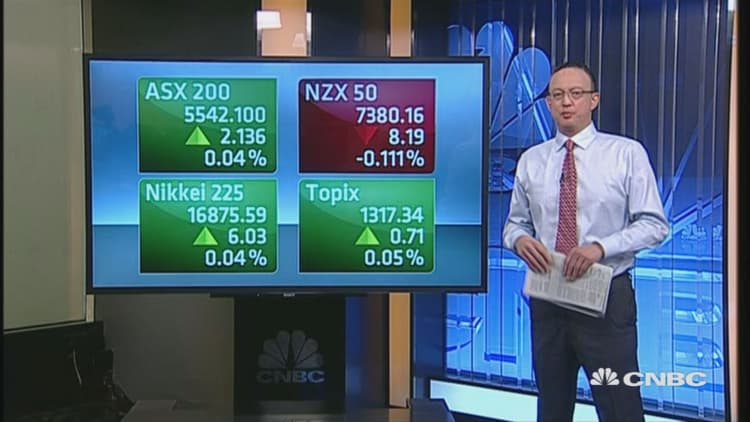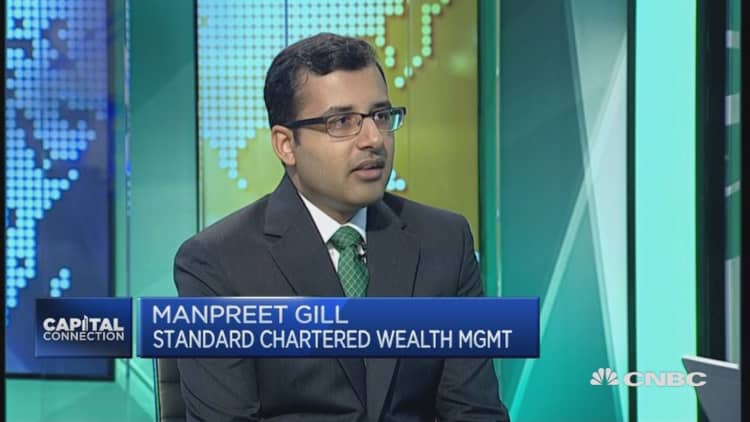


Wall Street's fresh record closing highs failed to boost sentiment in Asia markets on Tuesday, with Japanese shares selling off as the yen surged.
The benchmark fell 273.05 points, or 1.62 percent, to 16,596.51, while the broader Topix dropped 18.16 points, or 1.38 percent, to 1,298.47.
The Japanese yen traded as high as 100.14 against the dollar, compared with levels above 101.00 on Monday. As of 2:14 p.m. HK/SIN, the dollar/yen pair traded at 100.23.
In Australia, the benchmark ASX 200 slipped 7.96 points, or 0.14 percent, to 5,532.00, with the energy and gold sub-indexes beating the broader index to advance 1.09 and 1.3 percent, respectively. Offsetting those gains, the heavily weighted financials sub-index shed 0.26 percent.
In South Korea, the Kospi returned to trading after being shut on Monday for a public holiday, with the index finishing down 2.71 points, or 0.13 percent, at 2,047.76. In Hong Kong, the was flat at 22,937 in late afternoon trade.
Chinese mainland markets were mixed, with the composite closing down 14.71 points, or 0.47 percent, at 3,110.47, while the Shenzhen composite gained 13.56 points, or 0.67 percent, to 2,036.80.
Analysts told CNBC on Tuesday that the yen could see further strength in the coming weeks amid signs the market may be losing confidence in the Bank of Japan's ability to use monetary policy to give Japan's moribund economy a leg up.
Manpreet Gill, head of FICC investment strategy at Standard Chartered Wealth Management, told CNBC's "Capital Connection" that investors should be cautious on Japanese assets across the board in a strong yen environment.
"What a dollar/yen at 100, or potentially lower, is telling us is the market does not believe that the Bank of Japan is likely to be successful in reflating the economy," Gill said. "This could eventually lead to more extreme policy events down the line, but in the short term, it's quite possible the dollar/yen moves lower rather than higher."
Another analyst pointed to the central bank's disappointing monetary policy move last month, where the BOJ said it would only increase its purchase of exchange-traded funds (ETFs), while keeping interest rates unchanged, resulted in the underlying yen strength "asserting itself now."
"In the first and second quarters, the yen strength was because of the unwinding of the long Nikkei, long Japanese trade [positions], as global investors ... unwound the currency hedge and bought the yen," KH Heng, senior foreign exchange strategist at Credit Suisse Private Banking told CNBC's "Street Signs" on Tuesday.
"Now the problem is, we're entering the second leg. As the yen continues to strengthen, the Japanese lifers [insurance companies] are caught in a catch-22. The hedge ratios are very low for currencies," Heng said. He added for Japanese insurance companies, if they expect the yen to strengthen further to levels near 95, then they would buy more yen to hedge their bets.
Heng added given the yen's natural bias is to strengthen, the long term fair value of the currency could be around 93 or 94 against the dollar.
Japanese exporters sold off on Tuesday, with Toyota shares down 1.26 percent, Nissan down 1.73 percent and Nikon off 2.83 percent. Fujitsu shares bucked the trend, closing up 2.88 percent.
In the commodities space, oil prices pulled back during Asian hours after extending their rally on Monday.
Global benchmark Brent was down 0.83 percent at $47.95 a barrel, after advancing 2.9 percent overnight. U.S. crude futures were down 0.79 percent at $45.38, after rising 2.8 percent on Monday.
Energy plays in Asia closed mostly higher, with Santos gaining 2.51 percent and Woodside Petroleum up 0.95 percent, but Inpex closed down 1.03 percent, after erasing a gain of more than 2 percent following the yen's surge.
Sentiment toward oil was likely boosted by speculation that the world's oil producers might finally move to tackle the global supply glut, with prices likely getting an additional fillip from data showing a drawdown in U.S. crude inventory.
Reuters reported data from market intelligence firm Genscape estimated a drawdown of more than 350,000 barrels at the Cushing, Oklahoma delivery point for U.S. crude last week.
"The levity seen in oil prices spread throughout the rest of the commodity complex, assisted by some U.S. dollar weakness," said Angus Nicholson, a market analyst at brokerage firm IG.
But chances of global producers agreeing to actions to reduce their oil production appeared minimal, especially during September's OPEC meeting.
"The Saudis are happy to commit to some sort of OPEC-wide supply freeze deal so long as Iran is party to it. And Iran refuses to agree to any deal that will inhibit them from lifting their oil output to pre-sanctions level," said Nicholson.
In the currency market, the dollar weakened, trading at 95.093 against a basket of currencies as of 2:51 p.m. HK/SIN, compared with levels above 96.00 early last week and an earlier session high of 95.659.
Analysts attributed the greenback's swoon to San Francisco Federal Reserve President John Williams' comments on Monday in his regional Fed letter pushing for broad policy changes by governments and central banks and advocating for higher inflation targets amid concerns over persistently low interest rates.
"The market view is that the odds of a rate hike are again lengthening," said Patrick Bennett, a strategist at CIBC, in a note Tuesday.
The British pound strengthened against the dollar in the afternoon session, trading at $1.2910 as of 2:47 p.m. HK/SIN. Earlier, the pound traded as low as $1.2872, levels not seen since 1985, amid expectations the Bank of England would likely take further easing steps in the months ahead.
In company news, Reuters reported the China Evergrande Group raised its stake to nearly 7 percent in the country's biggest home builder, China Vanke. Evergrande purchased another 2.14 percent stake in Vanke for $823 million, Reuters said citing a regulatory filing to the Hong Kong stock exchange.
Shenzhen-listed shares of Vanke were up 10.02 percent, while Hong Kong listed shares of China Vanke were up 2.93 percent. Shares of China Evergrande added 1.02 percent.
After the Australian market close, major miner BHP Billiton reported its worst loss ever, coming in $6.39 billion in the red for the year ended June 30, swinging from a profit of $1.91 billion a year earlier. The company said it is determined to pay a final divided of 14 U.S. cents, fully franked, per share for the current period.
BHP's losses were attributed to a combination of factors including lower commodity prices and settlement costs for a dam disaster in Brazil that caused multiple casualties.
BHP shares closed the Australian trading session up 0.45 percent to 20.25 Australian dollars.
Stateside, all three indexes set record closing highs for a second time in a week. The rose 0.32 percent to 18,636.05, while the S&P 500 index closed 0.28 percent higher at 2,190.15. The composite rose 0.56 percent to 5,262.02.


